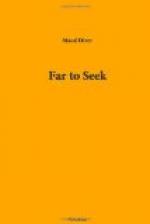“You’re young, Mr Sinclair—which doesn’t mean you’re wrong! Most of us, in our limited fashion, are trying to do what we can on those lines. But, after spending half a lifetime in this climate, doing our utmost to give the peasant—and the devil—his due, we’re apt to grow cynical——”
“Not to mention suicidal!” grunted the slave of work and whisky. “We Canal coolies—hardly visible to the naked eye—are adding something like an Egypt a year to the Empire. But, bless you, England takes no notice. Only let some underbred planter or raw subaltern bundle an Indian out of his carriage, or a drunken Tommy kick his servant in the spleen, and the whole British Constitution comes down about our ears!”
“Very true, sir—very true!” Inayat Khan leaned forward. His teeth gleamed in the dark of his beard. His large firm-featured face abounded in good sense and good humour. “How shall a man see justly if he holds the telescope wrong way round, as too many do over there. It also remains true, however, that the manners of certain Anglo-Indians create a lot of bad feeling. Your so-called reforms do not interest the masses or touch their imagination. But the boot of the low-class European touches their backs and their pride and hardens their hearts. That is only human nature. In the East a few gold grains of courtesy touch the heart more than a khillat[18] of political hotch-potch. I myself—though it is getting dangerous to say so!—am frankly opposed to this uncontrolled passion for reform. When all have done their duty in this great struggle, why such undignified clamour for rewards, which are now being flung back in the giver’s teeth. It has become a vicious circle. It was British policy in the first place—not so?—that stirred up this superficial ferment; and now it grows alarming, it is doctored with larger doses of the same medicine. We Indians who know how little the bulk of India has really changed, could laugh at the tamasha of Western fancy-dress, in small matters; but time for laughing has gone by. Time has come for saying firmly—all rights and aspirations will be granted, stopping short of actual government—otherwise——!”
He flung up his hands, looked round at the listening faces, and realised how completely he had let himself go. “Forgive me, Colonel. I fear I am talking too much,” he said in a changed tone.
“Indeed no,” Colonel Leigh assured him warmly. “In these difficult days, loyal and courageous friends like yourself are worth their weight in gold mohurs!”
Visibly flattered, the Moslem surveyed his own bulky person with a twinkle of amusement. “If value should go by weight, Inayat Khan would be worth a king’s ransom! But I assure you, Colonel, your country has many hundreds of friends like myself all over India, if only she would seek them out and give them encouragement—as Mr Sinclair said—instead of wasting it on volubles, who will never cease making trouble till India is in a blaze.”




